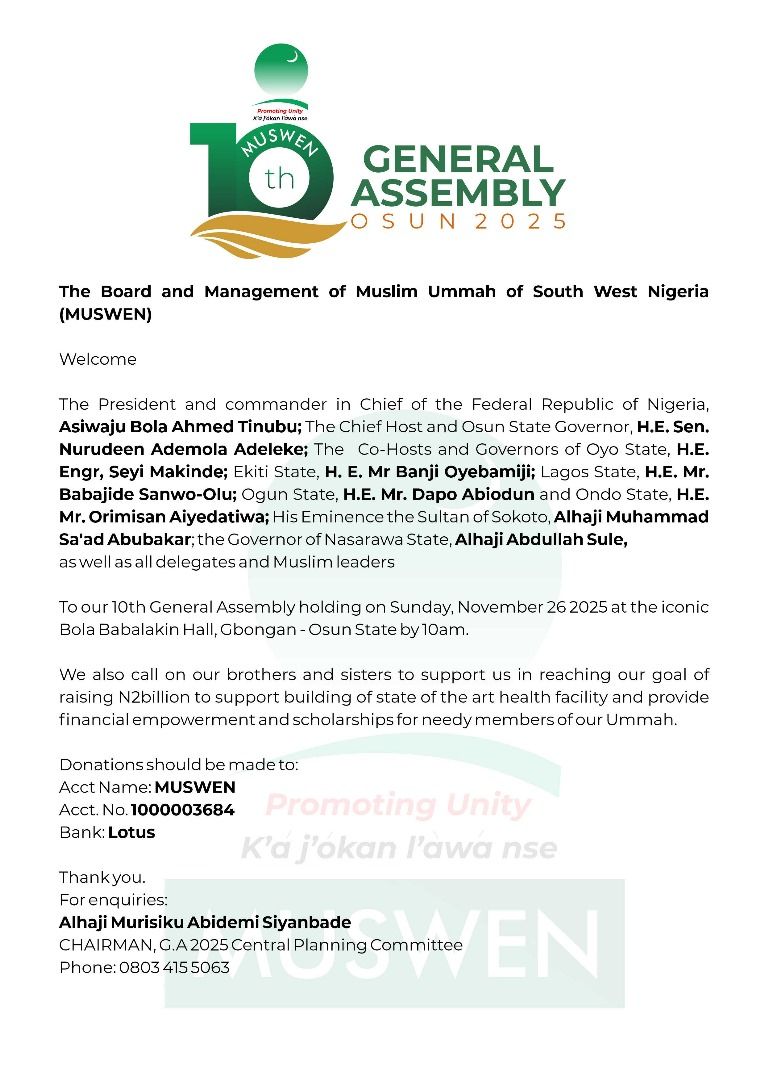
By Gidado Taofiq Miqdad – Daily Trust January 20, 2017.
The Prophet emphasised that good governance is all about service delivery and that your deliverables would be pointers to the quality of your leadership. He said: ‘The leader of the people is their servant’.

Furthermore, the Prophet (SAW) specifically told Abu Dharr Al Giffari not to accept any form of leadership position having seen in him the inability to cope with the burden therein. On the Day of Judgment, when the pandemonium shall be overwhelming, Allah shall free 7 categories of people from such catastrophe. Number one on the list shall be: a just leader. Furthermore, Allah warns those who see governance or leadership as do or die to beware of the day of accountability, the day when the leader and the led, the cheat and the one who had been cheated on shall stand at the judgment of Allah: ‘Woe to the defrauders, who, when they take the measure (of their dues) from men take it fully, but when they measure out to others or weigh out for them, they are deficient. Do not these think they shall be raised again? For a mighty day? The day on which men shall stand before the Lord of the worlds?’ (Qur’an 83 v 1-6)
THE INGRIDIENTS OF GOOD GOVERNANCE
Consultation; Rule of Law; Accountability; Mentorship; Efficiency in management.; Prompt and good service delivery.
LEVELS OF GOVERNANCE
Whenever one mentions governance and leadership, attention is generally focused on the political office holders. However, the Prophet (SAW) makes us to understand that every individual is involved in governance at one Level or the other. He said: ‘Everyone is a shepherd and would be asked about his flocks. The man is a shepherd in respect of his household, and would asked about his flocks, a woman is a shepherd in respect of the household of her husband, and would be asked about them, a servant is a shepherd in respect of the property of the master and would be asked about them, everyone is a shepherd and would be asked about his flocks.’
EXAMPLES OF GOOD GOVERNANCE FROM ISLAMIC HISTORY
Islamic history is replete with noble examples of good governance from the Sunnah of the Prophet (SAW) and the practice of the pious companions. Some of these examples are herein presented with a view to enthusing us to do the right things and forbid the wrong. However, it is important to keep in mind that neither the Prophet (SAW) nor his companions was an angel. Also, they practised Islam not in a more conducive environment than our own; rather they influenced their environment constantly albeit positively until Allah assisted them to bring about the change they desired in their clime and epoch. ‘For indeed Allah will not the condition of a people until they change that which is in their own minds.’ (Qur’an 13 v 11)
Forgiveness: The Prophet (SAW) said: ‘My Lord ordained that I forgive whoever oppressed me (personally). (I advise you to follow me in that)’ Forgiveness is valuable when one has the ability to punish and retaliate and yet forgives instead. Allah says in the Glorious Qur’an: “Don’t you wish that Allah forgives your sins? And Allah is Oft Forgiving Most Merciful.” (Qur’an 24 v 22) The Qur’an is replete with so many verses that urge Muslims to forgive and reject revenge or retaliation while they leave the transgressors to the judgment of Allah. This is because by continually forgiving others, a Muslim wins forgiveness from Allah.
Having said this, it is important to note that while the Prophet exemplified the attitude of magnanimity and forgiveness in respect of personal offences, he forbids those in authority from forgiving offences against the state. For example, Habbar bn Al Aswad was the one who murdered Zainab in cold blood while she was some months pregnant because she made an attempt to make the Hijrah from Makkah to Madinah. Later, Habbar became a Muslim and pleaded the Prophet for a pardon and he did. However, he ensured that justice was done if crimes were committed against the public. In such cases he permitted not one to intervene in the punishment of the offender. The reason being that if a public offence is forgiven, such an act opens the way for more injustice.
Justice: Allah commands justice…(Qur’an 16 v 97) The practice of the Prophet is that whenever he asks his companions to do something virtuous, he starts with his relatives; also, anytime he prohibits something, he starts with his relatives. The aim is to ensure that there are no sacred cows as far as maintaining justice is concerned. The example that readily comes to mind is that of a woman from the noble family of Banu Makhzum who committed theft. When she was to be punished, the relatives of the woman sought to plead with Usamah bn Zayd one to the dearest companions to the Prophet (SAW) to intervene on her behalf. On hearing this, the Prophet reproached Usamah saying: ‘Are you arguing for the cancellation of one of Allah’s limits?’ Then he stood up and announced: Nations before you were destroyed for the following reason: when somebody with a noble family or a hither rank committed theft, they used to leave him free, but when some poor and alone committed theft, they would punish him immediately. By Allah if Fatimah, the daughter of Muhammad were to commit theft, I would cut off her hand.
LEADERSHIP AND FOLLOWERSHIP
There is a symbiotic relationship between governance/leadership and followership. This is because neither of them can exist in isolation. However, the Prophet (SAW) cautioned that: ‘Allah will appoint for you a leader based on your disposition.’ Based on this some people have opined that there may not be a bad leader, there can only be bad followers. Furthermore, the Prophet also emphasised how influential the followership can be on the leadership since he has to resort to them from time to time for advice and consultation. The leader leverages on the strength of the advice by the followers to take well informed decisions on issues that confront him. The onus is therefore on the followers to be sincere and dispassionate in giving the leader useful advice. The Prophet (peace be on him) said: ‘The Deen is based on sincerity’. Furthermore, the followers should encourage the leader selflessly when he is doing the right thing and tell him the truth with courtesy and due respect when he is taking a wrong step. It is pertinent to state here that it is not allowed for the followers to publicly disparage the leader even when he is wrong. Thus, the Prophet (peace be on him) also says: ‘When Allah intends good (success) for a leader, He will provide him with truthful ministers (advisers)…and when Allah intends evil (failure) for a leader He will appoint for him bad ministers (advisers).’
It is important at this point to draw some comparisons between what good and bad governance are vis avid what good and bad followers are.
1.Good and Bad Forms of Governance. The Prophet Muhammad (SAW) said: ‘Some rulers will come to rule you who shall control your means of sustenance, they shall talk to you but (in the process) they shall lie to you, and they shall deal with you with impunity. They will not be pleased with you unless you consider their ugly deeds as good and believe their lies as the whole truth…’ Corruption, impunity and injustices characterise the system but yet the leadership does not accept responsibility for what goes on under its watch. This form of governance is clueless and bereft of ideas as well as the character needed to lead. It is an exclusive leadership without the requisite knowledge of what it takes to lead or a vision; thereby results to whipping up ethnic and religious sentiments to gain sympathy; in what is generally known as false flag operation where it uses fear to rule its people. This is a FASAAD (calamity).
On the other hand, a good form of governance provides sound leadership, unites the people irrespective of ethnic or religious background. It is an inclusive form of governance based on knowledge and intellect. It works hard to earn the trust and confidence of its people and yet does not take them for granted by a way of impunity. It is a form of government whose leadership puts its life on the line to defend the national integrity; it has record of prudent management of resources, respect for rule of law, justice, character and integrity. This form of governance fears Allah genuinely without a show of religiosity; it loves the people and is committed to their welfare.
GOOD GOVERNANCE IN THE MUSLIM UMMAH TODAY
Having discussed good governance in the light of what is happening around us, it is important to look inwards with a view to critically appraising ourselves. After all, charity begins at home. Thus, there is the need to retroactively engage our minds on what happened to us; we need to pause and ask: Where are we? Where do want to be? How much control do we have in our areas of influence? For example: what is happening to our children at school, to our pregnant women in the hospitals and maternity clinics. We need to know our perception index especially in the field of Da’wah. We need to exploit the paradigm shift: Before now some people have been blowing the trumpet against us negatively, now we can leverage on the changes in our socio political landscape and therefore begin to blow it ourselves.
Concluding part of a series on Islam culled from Daily Trust









